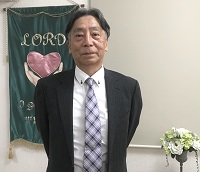↓Audio link to the sermon:(1st worship recording)
(If you can’t listen on your iPhone, please update your iOS)
He was not far from the house when the centurion sent friends to say to him: “Lord, don’t trouble yourself, for I do not deserve to have you come under my roof. 7 That is why I did not even consider myself worthy to come to you. But say the word, and my servant will be healed. 8 For I myself am a man under authority, with soldiers under me. I tell this one, ‘Go,’ and he goes; and that one, ‘Come,’ and he comes. I say to my servant, ‘Do this,’ and he does it.”
9 When Jesus heard this, he was amazed at him, and turning to the crowd following him, he said, “I tell you, I have not found such great faith even in Israel.” 10 Then the men who had been sent returned to the house and found the servant well.
① “What does it mean to believe in God? What does it mean to believe in Jesus? What kind of faith should a Christian have?” In today’s passage, we can learn some answers to these questions. For this reason, Christians have loved this story about the centurion for many generations.
I hope that we will grow in our faith even more, by learning from today’s passage and asking what it means to believe in Jesus Christ.
② Before we begin, I would like to clarify one thing:
That is, the meaning of the word “believe.” In Japanese, there are two main meanings.
First, to believe means “to assume that something is true”. This happened a long time ago, but when I was pastoring Hiratsuka Covenant Church, a young man there believed that I was wearing a wig.
It didn’t bother me that he believed this. But since it wasn’t true, I tried to tell him in an indirect way, “This isn’t a wig.” Unfortunately, he didn’t get the message. He really thought, “That pastor has a wig. I know he’s hiding it!”
At that time, I thought: “When people really believe something, they can be stubborn. Instead of coming closer to the truth, they end up going further away from the truth. Convictions are dangerous things.”
But this is not the kind of belief the Bible talks about when it says “Believe in the Lord Jesus!” Yet many people assume that this is the kind of belief in God that the Bible calls for. This is a huge misunderstanding.
Now, here is the second meaning for the word “believe”. To believe is to “trust deeply”.
To give an example: “I was betrayed by a friend I believed in.” This example talks about belief as trust. “Although I trusted deeply in this friend, they did a terrible thing to me.” That’s an example of the second kind of belief. Belief is trust.
When the Bible calls us to believe in God, this is what it means. “Trust deeply.” When the Bible comforts us by saying “believe in God,” it means: “Trust deeply in God. Even though this terrible thing has happened, don’t let it shake your faith. Hold on with courage and confidence. As you continue to trust, you will slowly but surely see the reality and depth of God’s love.”
③ In today’s passage, we can learn about the true meaning of belief from a Roman centurion. First, let’s look at what kind of person the centurion was.
In the first verse, we read that Jesus entered Capernaum. So the story took place in a town called Capernaum. In those days, the region of Galilee—where Capernaum is—was ruled by Herod Antipas, who governed under the Roman Empire. So our centurion may have belonged to the army under Herod Antipas.
Since the centurion asked for Jesus’ help through Jewish elders, we know that he was not a Jew. But I don’t
think he was Roman either. It’s unlikely that Herod Antipas would employ Romans under him. It’s thought
that the centurion was neither Jew nor Roman, but from some other nation.
Verse 3 says that he asked the Jewish elders for help, and they went to see Jesus. From the elders, we learn that they respected the centurion greatly. This was unusual. At the time, many Jews called foreigners “Gentiles” and looked down on them.
Furthermore, we hear from the elders that this centurion helped to build their synagogue. We don’t know if he helped by giving money to the construction of a synagogue, but we know that he played an important part. Did the elders respect him because of his status or wealth? Unlikely. Surely the proud Jews did not respect
foreigners only for status or wealth. They respected his character, his sincerity.
Another thing confirms that this centurion was greatly respected. The centurion had a servant (or slave). In those days, a servant was a hired worker. This servant he valued highly was sick and about to die. That’s why the centurion asked for Jesus’ help. He sent the Jewish elders to plead for help, not for himself but for his slave. He did all this for a slave. What he did was unusual in those days.
④ “Come and heal my servant” was the centurion’s request.
“Maranatha” is how the Jews would say it in the Aramaic language. You may have heard the word “maranatha” in a worship song. That is the same word. The Jewish elders pleaded with Jesus to come, using that expression: “Maranatha! Come, Lord!” Hearing that, Jesus went with them.
But on the way, they met the centurion’s friends, who were sent to say, “Lord, don’t trouble yourself.” In other words, “You don’t have to come.” If I was part of that group walking with Jesus, I would have thought, “Eh, what now? You asked him to come, and he came all this way. Now you say ‘Don’t come’. What do you mean? Do you want him to come or not?”
But after Jesus heard the man’s reason for telling him not to come, he was amazed at the centurion’s faith and gave him the highest praise. “I tell you, I have not found such great faith even in Israel.”
⑤ What was so amazing about the centurion’s faith?
In verses 6 and 7, he said, “Lord, don’t trouble yourself, for I do not deserve to have you come under my roof. That is why I did not even consider myself worthy to come to you. But say the word, and my servant will be healed.”
First, he said to Jesus, “I do not deserve to have you come under my roof.” He was fearful. At first, seeing his servant about to die, he acted quickly and called for Jesus’ help. However…
When he heard news that Jesus was coming, he was shaken with awe. He revered Jesus. This awe is fear that comes from respect. It is the same awe that Peter felt when he met Jesus by the Sea of Galilee. Peter realized, “This man is the Savior!” So he said, “Go away from me, Lord; I am a sinful man!” But after that, he left everything to follow Jesus.
The same thing happened with the centurion. After saying words that sounded like he was pushing Jesus away, he did the opposite. It was out of deep reverence for the Lord Jesus. To have such reverence and humility before Jesus … I hope to become that kind of believer too.
⑥ The next thing the centurion said shows us more about his faith. In verse 7, he said, “But say the word, and my servant will be healed.”
In other words, he told Jesus, “Even just by your words my servant can be healed.” I don’t think many people have the kind of faith he had.
To outsiders, the faith of every Christian may look similar. But just as all faces are different, each Christian’s faith is different. A faith that is sensitive… a faith that is self-sacrificing and shows itself in actions… a faith that remains unshaken no matter what happens… the substance of everyone’s faith is different. While the core of our faith should be the same, we are not clones; and therefore each person has their own distinct characteristics. If we are all the same in every way, that would be strange.
Still, from my experience as a pastor, I think that the centurion’s faith was rare. In my experience, most people in a similar situation would pray like this, “Jesus, please come to where I am. Heal me. And listen to me.” But the centurion prayed, “Jesus, you don’t have to come. Your word is enough. Just by your word, my servant will be healed.”
Today, we would say he is a man who believes solely in the word of the Bible. I think that if he had lived in our times, with all kinds of Bible translations available, he would have read the Bible and simply put his faith in the words. He might be the kind of person who says, “God saved me! He redeemed me from sin! How He loves me!”
⑦ How did he have so much faith in the power of Jesus’ word? Let’s hear his own explanation.
In verse 8 he says, “For I myself am a man under authority, with soldiers under me.” As a military commander, his word was carried out by the soldiers under him.
You might not like to hear about the military, but I believe this analogy was the best way he could explain Jesus’ authority. A soldier carries out his commander’s orders, exactly as he is told. Nothing should interfere. That was the centurion’s explanation. In other words, if the Lord Jesus gave an order, surely it would be carried out—just like that.
The purity of his belief is almost embarrassing to someone so impure like me. But the Lord Jesus was amazed at that pure faith. He said to the crowd following him: “I tell you, I have not found such great faith even in Israel”.
Surely, Jesus’ words were not only for the crowd then, but also for us who are gathered here to worship today.
Some people’s faith grows stronger when they have a mystical or religious experience, and they will cry out, “Hallelujah!” But when nothing seems to happen again for a long time, their faith shrinks. The centurion’s faith was not like that. In a time of crisis, when we see the Lord’s hand reaching out to us, our faith grows stronger as a result. But the centurion’s faith seems like the kind that nothing can shake—it remains strong even when he has no mystical experience.
It was the kind of faith that hears God saying “Don’t be afraid, for I am your God” and responds “I have nothing to fear.” It’s the kind of faith that hears God saying “I love you” and responds “I am God’s beloved!”
If the centurion heard Jesus say “I am the resurrection and the life. He who believes in me shall not perish,” I believe he would respond, “In Jesus is resurrection and life. If I am in him, I will live even if I die.”
What faith he had! What character! I believe that we, too, long to grow into such faith.
(If you can’t hear from the bar above, click the blue button)
iPhone




